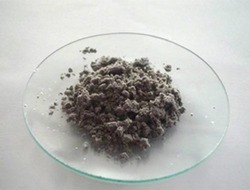Hydride
Hydride is a chemical compound in which hydrogen is bonded to another element. These compounds are divided into two main categories: ionic hydrides, which involve hydrogen ions (H−), and covalent hydrides, where hydrogen atoms form covalent bonds with another element. Hydrides play a crucial role in various fields, including chemistry, materials science, and energy storage technologies.
Types of Hydrides[edit | edit source]
Hydrides can be classified into three primary types based on their bonding and properties:
Ionic Hydrides[edit | edit source]
Ionic hydrides are formed when hydrogen reacts with s-block elements, such as lithium, sodium, and other alkali metals, as well as some alkaline earth metals. In these compounds, hydrogen acts as a hydride ion (H−), showcasing its ability to gain an electron. Ionic hydrides are typically used as strong reducing agents and bases in organic synthesis and are characterized by their high reactivity towards water.
Covalent Hydrides[edit | edit source]
Covalent hydrides are compounds where hydrogen forms covalent bonds with more electronegative elements, including non-metals and metalloids. This category encompasses a wide range of compounds, such as water (H₂O), methane (CH₄), and ammonia (NH₃). Covalent hydrides are integral to life on Earth and are extensively studied in the field of organic chemistry.
Metal Hydrides[edit | edit source]
Metal hydrides consist of hydrogen atoms that are bonded to transition or post-transition metals. These compounds can exhibit both ionic and covalent characteristics. Metal hydrides are often used in energy storage systems, particularly in hydrogen storage for fuel cell applications, due to their ability to reversibly absorb and release hydrogen gas.
Properties and Applications[edit | edit source]
Hydrides exhibit a wide range of physical and chemical properties, depending on their composition and structure. Ionic hydrides are generally high melting point solids that react vigorously with water to release hydrogen gas. Covalent hydrides, on the other hand, can be gases, liquids, or solids at room temperature and display diverse chemical behaviors.
One of the most significant applications of hydrides is in hydrogen storage, where metal hydrides are used to store hydrogen gas safely and compactly. This technology is crucial for the development of hydrogen fuel cells and other clean energy solutions. Additionally, hydrides are used in various chemical syntheses, including the reduction of organic compounds and the production of various chemicals.
Safety Considerations[edit | edit source]
Handling hydrides, especially reactive ionic and metal hydrides, requires caution due to their potential to react explosively with water and air. Proper safety protocols, including the use of inert atmospheres and moisture-free environments, are essential when working with these compounds.
Conclusion[edit | edit source]
Hydrides are a diverse group of compounds with significant implications in chemistry, materials science, and energy technology. Their varied properties and applications underscore the importance of understanding these compounds in advancing scientific and technological frontiers.
Search WikiMD
Ad.Tired of being Overweight? Try W8MD's physician weight loss program.
Semaglutide (Ozempic / Wegovy and Tirzepatide (Mounjaro / Zepbound) available.
Advertise on WikiMD
|
WikiMD's Wellness Encyclopedia |
| Let Food Be Thy Medicine Medicine Thy Food - Hippocrates |
Translate this page: - East Asian
中文,
日本,
한국어,
South Asian
हिन्दी,
தமிழ்,
తెలుగు,
Urdu,
ಕನ್ನಡ,
Southeast Asian
Indonesian,
Vietnamese,
Thai,
မြန်မာဘာသာ,
বাংলা
European
español,
Deutsch,
français,
Greek,
português do Brasil,
polski,
română,
русский,
Nederlands,
norsk,
svenska,
suomi,
Italian
Middle Eastern & African
عربى,
Turkish,
Persian,
Hebrew,
Afrikaans,
isiZulu,
Kiswahili,
Other
Bulgarian,
Hungarian,
Czech,
Swedish,
മലയാളം,
मराठी,
ਪੰਜਾਬੀ,
ગુજરાતી,
Portuguese,
Ukrainian
Medical Disclaimer: WikiMD is not a substitute for professional medical advice. The information on WikiMD is provided as an information resource only, may be incorrect, outdated or misleading, and is not to be used or relied on for any diagnostic or treatment purposes. Please consult your health care provider before making any healthcare decisions or for guidance about a specific medical condition. WikiMD expressly disclaims responsibility, and shall have no liability, for any damages, loss, injury, or liability whatsoever suffered as a result of your reliance on the information contained in this site. By visiting this site you agree to the foregoing terms and conditions, which may from time to time be changed or supplemented by WikiMD. If you do not agree to the foregoing terms and conditions, you should not enter or use this site. See full disclaimer.
Credits:Most images are courtesy of Wikimedia commons, and templates, categories Wikipedia, licensed under CC BY SA or similar.
Contributors: Prab R. Tumpati, MD




